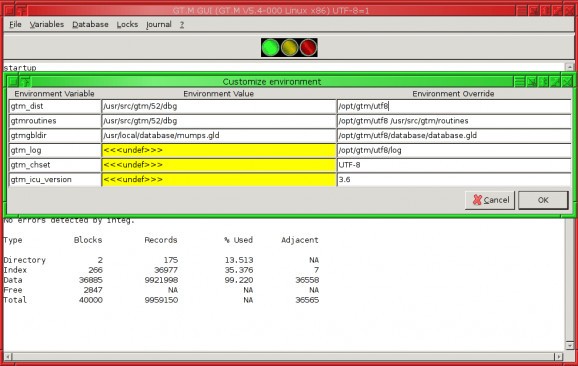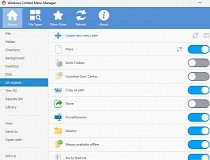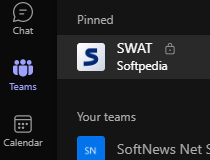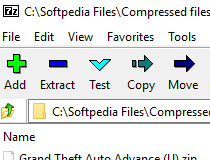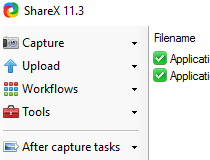A high-performance database engine. #Database engine #Database server #Transaction processing #Database #Engine #Server
GT.M is the high-performance database engine offered by FIS (Fidelity National Information Services).
GT.M is designed for business continuity and intense transaction processing throughput.
What's new in GT.M 6.1-000:
- Virtually unlimited global variable sizes: With the ability to map global variables to database regions at the level of subscripts rather than a complete global variable, GT.M global variables are now limited by factors external to GT.M - available storage, file system limits, memory, and so on. This has additional benefits. For example, if there are ranges of a global variable within which there are patterns of sequential access, mapping each range to a different region can take advantage of one of many optimizations in the GT.M database engine for sequential access.
- Transport Layer Security (TLS/SSL) for replication: With enhancements to the architecture of the encryption plug-in, GT.M can replicate over a secure connection. The reference implementation of a plug-in included with GT.M is tested with OpenSSL. The reference implementation also provides an option to use libgcrypt (from GnuPG) and libcrypto (OpenSSL) in "FIPS mode," removing a need to modify the plugin for sites that require certification for compliance with FIPS 140-2. Note: Achieving FIPS 140-2 certification requires actions and controls well beyond the purview of GT.M, including underlying cryptographic libraries that are certifiably FIPS compliant, administrative controls, and so on. FIS neither provides cryptographic libraries with GT.M nor recommends the use of any specific library - refer to the GT.M Administration and Operations Guide UNIX Edition for more details.
- Relink recursive: Processes can explicitly ZLINK new versions of routines even when they have prior versions of routines with the same name already on the process stack. When a process links a routine with the same name as an existing routine, future calls use the new routine. Prior versions of that routine on the stack remain on the stack until they QUIT, at which point they become inaccessible. This enhancement provides a mechanism to patch long-running processes, one that allows a process to retain more state than previous techniques.
- SOCKET device support for local sockets (also known as UNIX domain sockets).
GT.M 6.1-000
add to watchlist add to download basket send us an update REPORT- runs on:
- Linux
1 screenshot:
- main category:
- Database
- developer:
- visit homepage
Bitdefender Antivirus Free 27.0.35.146
Feather-light and free antivirus solution from renowned developer that keeps the PC protected at all times from malware without requiring user configuration
Context Menu Manager 3.3.3.1
Customize Windows’ original right-click context menu using this free, portable and open-source utility meant to enhance your workflow
Microsoft Teams 24060.3102.2733.5911 Home / 1.7.00.7956 Work
Effortlessly chat, collaborate on projects, and transfer files within a business-like environment by employing this Microsoft-vetted application
Windows Sandbox Launcher 1.0.0
Set up the Windows Sandbox parameters to your specific requirements, with this dedicated launcher that features advanced parametrization
7-Zip 23.01 / 24.04 Beta
An intuitive application with a very good compression ratio that can help you not only create and extract archives, but also test them for errors
Zoom Client 6.0.3.37634
The official desktop client for Zoom, the popular video conferencing and collaboration tool used by millions of people worldwide
calibre 7.9.0
Effortlessly keep your e-book library thoroughly organized with the help of the numerous features offered by this efficient and capable manager
ShareX 16.0.1
Capture your screen, create GIFs, and record videos through this versatile solution that includes various other amenities: an OCR scanner, image uploader, URL shortener, and much more
IrfanView 4.67
With support for a long list of plugins, this minimalistic utility helps you view images, as well as edit and convert them using a built-in batch mode
4k Video Downloader 1.5.3.0080 Plus / 4.30.0.5655
Export your favorite YouTube videos and playlists with this intuitive, lightweight program, built to facilitate downloading clips from the popular website
% discount
ShareX
- ShareX
- IrfanView
- 4k Video Downloader
- Bitdefender Antivirus Free
- Context Menu Manager
- Microsoft Teams
- Windows Sandbox Launcher
- 7-Zip
- Zoom Client
- calibre
essentials
Click to load comments
This enables Disqus, Inc. to process some of your data. Disqus privacy policy
